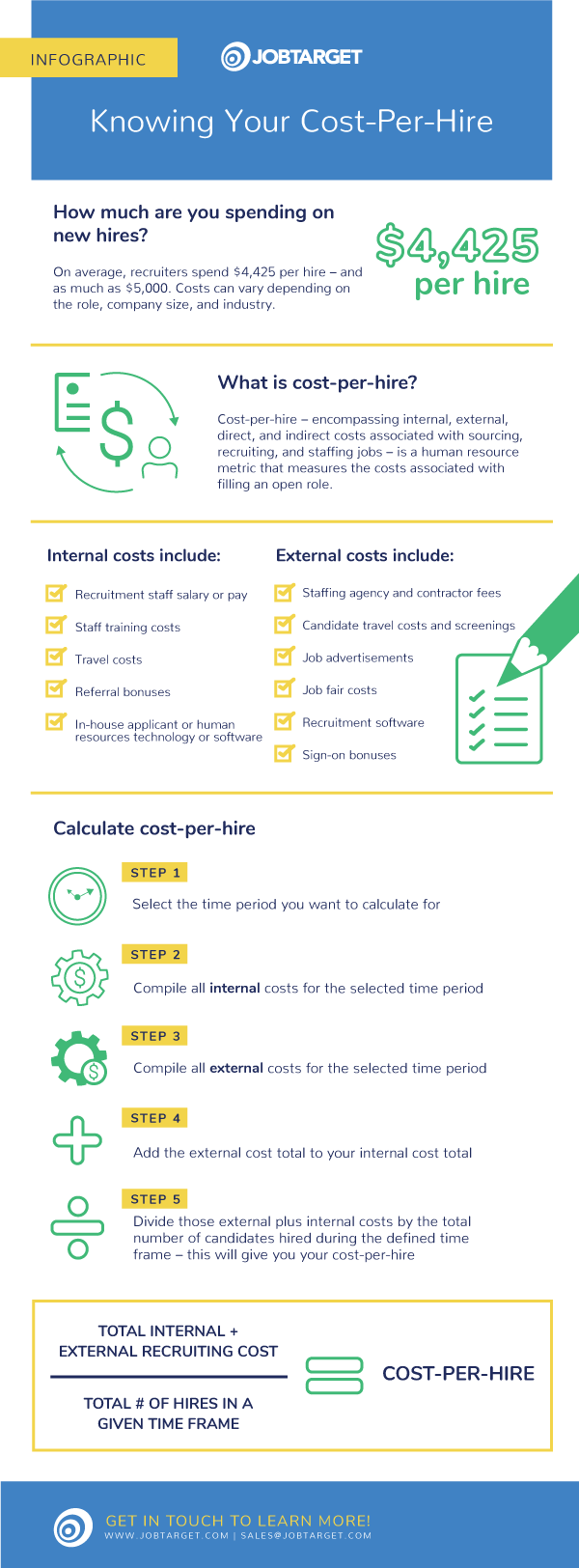2 min read
Step Up Your Job Title Game with These Essential Tips
Selecting the right job title for your recruitment advertisement is extremely beneficial for attracting the right talent. The job title is the...




|
|
|
|
|
|
|
Easy Apply Easy Apply Easy Apply |
Easy Apply Easy Apply |
Easy Apply |
Easy Apply |
Easy Apply Easy Apply Easy Apply |


According to research by Zippia recruiters spend $4,425 per hire on average – though costs can rise to as much as $5,000 per candidate – depending on role, size of the company, and industry.
What is cost-per-hire?
According to the Society of Human Resource Management (SHRM), cost-per-hire – encompassing internal, external, direct and indirect costs associated with sourcing, recruiting and staffing an open position – is a human resource metric that measures the costs associated with filling an open role.
The internal and external cost factor
To accurately measure cost-per-hire, you’ll need to know (and track) the internal and external recruiting costs that go into filling each role. While it may seem straightforward to calculate, some of the efforts that go into your cost-per-hire can be easily overlooked. Here are some of the internal and external costs that should be factored in when determining the cost of bringing on a new employee.
Internal costs should include:
Internal recruitment staff salary or pay
Staff training costs
Travel costs or referral bonuses
In-house applicant or human resources technology or software:
Applicant tracking system (ATS)
Human resource information system (HRIS)
External costs should include:
Staffing agency and contractor fees
Job advertisements and job fair costs
Recruitment software, including analytics data and record-keeping
Candidate travel costs and screenings (background checks, drug testing)
Sign-on bonuses
While cost may vary based on company size, industry, and technology being used, knowing the difference between – and accounting for – internal and external costs can provide the most accurate look at how much your new hires are costing, and help identify improvement areas within your recruiting strategy.
How do you calculate cost-per-hire?
Select the time period you want to calculate for
Compile all external costs for the selected time period
Compile all internal costs for the selected time period
Add the external cost total to your internal cost total
Divide those external plus internal costs by the total number of candidates hired during the defined time frame – this will give you your cost-per-hire
Example: Between January 1, 2022 and March 31, 2022 your company:
Spent $5,000 on internal recruiting costs
Spent $10,000 on external recruiting costs
Hired 5 new employees
$5,000 + $10,000 = $15,000 / 5 = $3,000 cost-per-hire for Q1 of 2022
Bottom line
By calculating and knowing your cost-per-hire, you can adjust your recruiting strategies and processes to be more efficient and effective – identifying where to invest time and money. Download Your Cost-Per-Hire Guide

2 min read
Selecting the right job title for your recruitment advertisement is extremely beneficial for attracting the right talent. The job title is the...
2 min read
Workplace diversity programs have progressed over the years to be less about compliance and more about impacting real change in company culture....
2 min read
Record keeping can be extremely confusing for federal contractors and subcontractors and the Office of Federal Contract Compliance Programs...